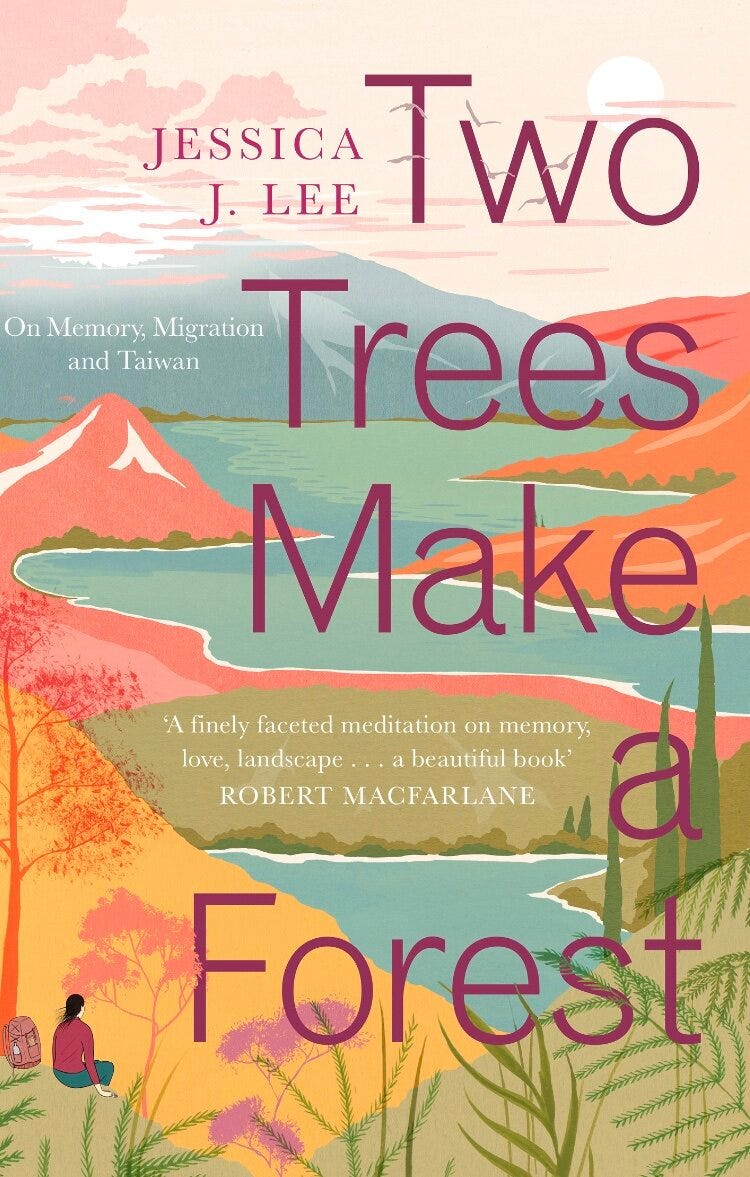🌱Fieldnotes in Ecocultural Communication
Two Trees Make A Forest + Killers: J pod on the brink + COVID-19 and Science Communication + Five Writing Tools + More

Hi everyone, welcome back to Wild Ones, a bi-weekly digest by me, Gavin Lamb, about news, ideas, research, and tips in environmental communication. If you’re new, welcome! You can read more about why I started Wild Ones here. Sign up here to get these digests in your inbox:
📚 What I’m reading
Two Trees Make A Forest: In Search of My Family's Past Among Taiwan's Mountains and Coasts. by Jessica J. Lee.
Jessica J. Lee is a British-Canadian-Taiwanese author. She currently lives in Berlin. She has a PhD in Environmental History and Aesthetics and is the founding editor of The Willowherb Review, ‘a digital platform to celebrate and bolster nature writing by emerging and established writers of colour.’
Here are some quotes from her recent book, Two Trees Make a Forest, that struck a chord with me:
“Language barriers play a prominent role in this story….The gaps that bind us span more than the distances between words.”
“Learning a species is a way of quieting my thoughts. I do not have a good memory by nature: names slip away, as do faces; it is only when I take the time to draw a plant, to render its name in ink, that I stand a chance of knowing it.”
“I find in Taiwanese nature writing rather realist worlds, with essays, poems, and stories tied inextricably to activism. The words I read are subtle but matter-of-fact, not elegiac, though they so often deal with loss. Emerging in 1981 with the writers Han Han and Ma Yigong’s “We Have Only One Earth” (我們只有一個地球), the genre’s early texts tackle the scale of environmental loss on the island. Drawing deeply on the natural sciences and written at a time when forestry had all but devastated Taiwan’s hills, when cities were growing apace, the early works contain an energy quite unlike the sweetened prose I’ve grown used to in British nature writing.”
Here is a great interview with Jessica J. Lee about her new book, with a fascinating discussion about the role of nature writing in different cultural contexts and across different languages:
🎧 What I’m listening to
Here are two new podcasts I came across this week!
Killers: J pod on the brink. A new podcast about the southern resident killer whale population.
I’m always on the look out for great examples of environmental communication that sheds light on the complex intersection of social, ecological, political and cultural issues converging around threatened species. This podcast on the southern resident killer whale population, now at population of 73 whales across three pods, caught my attention. It’s really well done, and I reccomend checking it out if you are interested in communication about wildlife conservation.
“In the summer of 2018, a mother killer whale captivated the world as she carried her dead calf for 17 days. Some call it grief; many say it served as a wake-up call for the plight of her endangered pod - J pod - and the health of the Pacific Ocean.
In the new CBC British Columbia original podcast, Killers: J pod on the brink, CBC Radio One's award-winning host Gloria Macarenko dives deep into the elements putting B.C.'s orca population at risk, exploring climate change, pollution, and politics.”
Dismantled: “Dismantled is a podcast for intersectional environmentalists. We believe conversations about the climate crisis must center, and be led by, those most impacted by it: Black, Indigenous + POC communities.”
👀 What I’m watching
“COVID-19 and Science Communication with Liz Neeley and Ed Yong”
“The COVID-19 pandemic has touched every part of our global society, putting science and scientists in the front seat as we navigate this crisis. On June 4, College of the Environment Dean Lisa Graumlich spoke with special guests Liz Neeley, Executive Director of the Story Collider, and Ed Yong, staff writer covering science and the coronavirus for The Atlantic for a special edition of Amplify. We explored the intersection of science and society, the role of science journalism and science communication and how to make sense of the deluge of information and turn it into action. You can watch their conversation below!”
🔍 Eco-Communication Tools I’m exploring
Five Writing Tools For Compelling Environmental Communication (I’ve shared these tools before separately, but I’ve gathered them all together here to find more easily:)
💬 Quote I’m thinking about
“I have learned many words for ‘island’: isle, atoll, eyot, skerry. They exist in archipelagos or alone, and I have always understood them by their relation to water. The English word “island,” after all, comes from the German “aue,” from the Latin “aqua,” meaning “water.” An island is a world afloat; an archipelago is a place pelagic.
The Chinese word for island knows nothing of water. For a civilization grown inland from the sea, the vastness of mountains was a better metaphor: 島 dao (“island,” pronounced “to” in Taiwanese) is built from the relationship between earth and sky. The character contains the idea that a bird 鳥 (niao) can rest on a lone mountain 山 (shan).”
– Jessica J. Lee, in Two Trees Make a Forest.
Thanks so much as always for your interest in my work, and if you found this useful, or have suggestions to make this digest better, I'd love to hear from you. Leave a comment to let me know what you think about this digest:)


